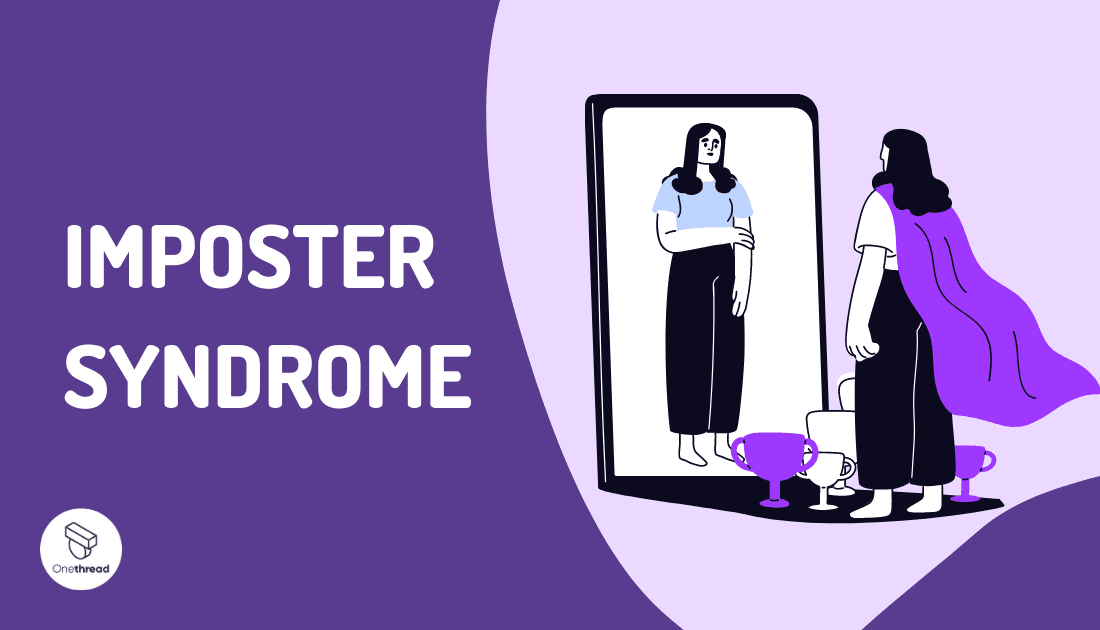Answer a question. Do you have one of these issues in you?
- Constant self-doubt and fear of being exposed as a fraud
- Downplaying achievements and attributing success to external factors
- Setting excessively high standards for oneself and fearing failure
- Feeling undeserving of recognition and unable to internalize praise
- Comparing oneself to others and feeling inferior despite evidence of competence
If one or more of these characteristics is present in you, you’re suffering from Imposter Syndrome.
What Does Having Imposter Syndrom at Work Look Like?
Imposter Syndrome at work refers to a psychological pattern in which individuals doubt their accomplishments and experience persistent feelings of inadequacy and self-doubt in their professional roles.
Despite external evidence of competence and success, individuals with Imposter Syndrome often attribute their achievements to luck or external factors, fearing that they will be exposed as frauds.
This phenomenon can affect people across various industries and at different stages of their careers. It is not limited to those lacking experience or expertise; even highly accomplished individuals may experience Imposter Syndrome.
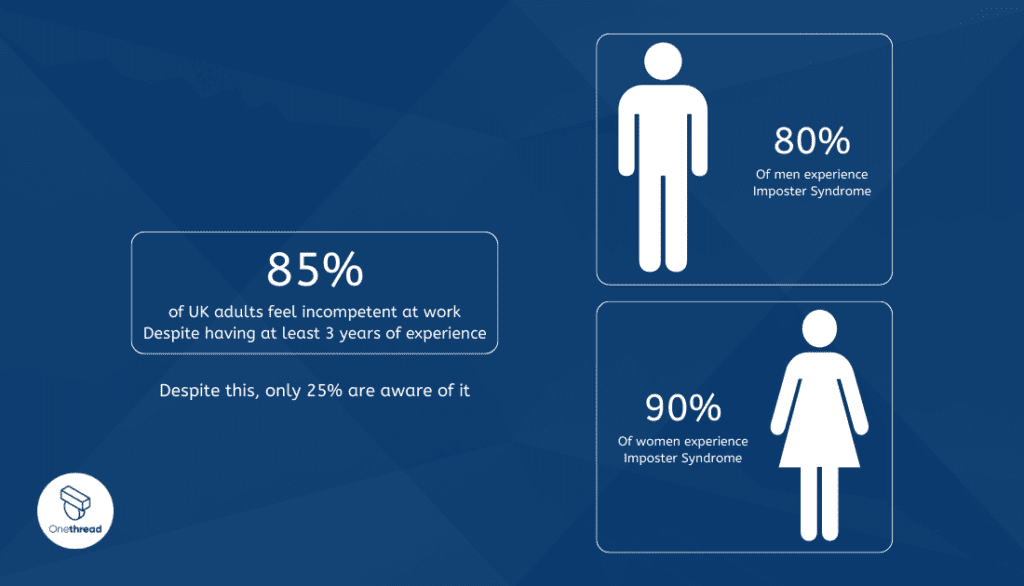
The characteristics associated with Imposter Syndrome include downplaying achievements, setting unrealistically high standards, feeling undeserving of recognition, and constantly comparing oneself to others.
Imposter Syndrome can have detrimental effects on one’s career and well-being, leading to increased stress, anxiety, and a lack of confidence. However, by recognizing the signs and understanding its underlying causes, individuals can work towards overcoming Imposter Syndrome.
Developing self-awareness, seeking support from mentors and colleagues, reframing negative self-talk, and embracing one’s strengths are some of the strategies that can help individuals combat Imposter Syndrome and foster a more positive and fulfilling work environment.
Wait, So If I Have Imposter Syndrome At Work, Am I a Bad Person?
No, having Imposter Syndrome does not make a person inherently bad. Imposter Syndrome is a psychological phenomenon that affects many individuals, regardless of their character or moral values. It is a common experience that can be influenced by various factors, such as upbringing, societal pressures, or personal insecurities.
Imposter Syndrome is not a reflection of one’s character or worth as a person. It is a mindset and set of beliefs about oneself and one’s abilities. People who experience Imposter Syndrome often have high standards and a fear of failure, which can lead to self-doubt and feelings of inadequacy. However, these feelings do not define their overall character or moral compass.
It’s important to approach Imposter Syndrome with empathy and understanding. Supporting individuals who experience Imposter Syndrome can help them recognize their value and overcome self-doubt. Remember, experiencing Imposter Syndrome is a common human experience, and it does not make someone inherently bad or unworthy.
A Big Picture Of the ‘Imposter’s Characteristics’ At Work
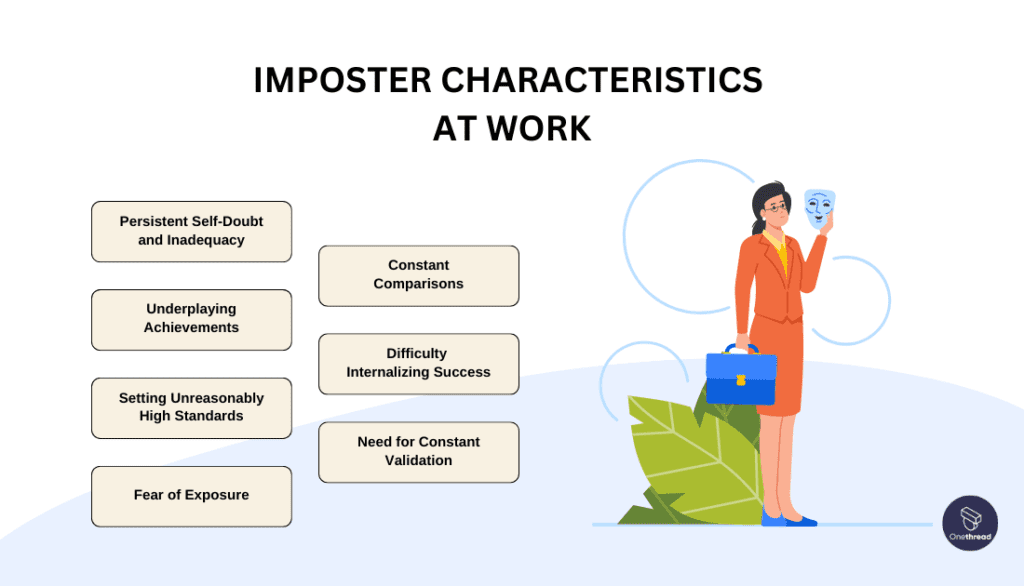
How do you know if you have the characteristics of an imposter at work? Well, read on about these personalities. You’ll find out.
Persistent Self-Doubt and Inadequacy
People with Imposter Syndrome often experience ongoing self-doubt, feeling like they don’t measure up to their colleagues or the expectations placed upon them. They have a deep-seated belief that they are not as competent as others perceive them to be.
Underplaying Achievements
Individuals with Imposter Syndrome tend to downplay their accomplishments. They may attribute their success to luck, timing, or external circumstances, rather than acknowledging their skills and efforts. They struggle to internalize positive feedback or recognition.
Setting Unreasonably High Standards
Imposter Syndrome sufferers often set exceptionally high standards for themselves. They strive for perfection in everything they do, fearing that any hint of imperfection will expose their perceived inadequacy. This self-imposed pressure can be overwhelming and contribute to chronic stress.

Fear of Exposure
Those experiencing Imposter Syndrome constantly worry about being exposed as a fraud or being found out for not possessing the level of competence they believe others expect from them. This fear can lead to anxiety and a reluctance to take on new challenges or responsibilities.
Constant Comparisons
Comparing themselves to others is a common tendency among individuals with Imposter Syndrome. They often believe that everyone around them is more competent, accomplished, or deserving of success. This comparison mindset reinforces their feelings of being an imposter.
Difficulty Internalizing Success
Even when achieving positive outcomes, individuals with Imposter Syndrome struggle to internalize their accomplishments. They dismiss praise, discount their achievements, and feel unworthy of recognition. They attribute success to external factors rather than acknowledging their capabilities.
Need for Constant Validation
Imposter Syndrome often drives individuals to seek validation from others. They rely heavily on external feedback and reassurance to confirm their worthiness, perpetuating a cycle of seeking constant approval.
Is Imposter Syndrome an Indicator of Incompetence at Work?
The phenomenon of imposter syndrome often raises questions about an individual’s competence in their work. However, it’s important to understand that imposter syndrome doesn’t inherently indicate incompetence. Imposter syndrome is a psychological pattern where capable individuals doubt their skills and fear being exposed as frauds, despite evidence to the contrary.
Imposter syndrome can affect even the most accomplished professionals, and its presence doesn’t reflect an individual’s actual abilities. Those grappling with imposter feelings might be quite skilled and proficient in their roles, but their perception is skewed by self-doubt.
In agile development and any professional context, recognizing imposter syndrome is pivotal for fostering a supportive work environment. Instead of equating imposter syndrome with incompetence, it’s more productive to provide encouragement, acknowledge achievements, and offer reassurance. By addressing imposter syndrome, teams can help individuals regain confidence, contribute effectively, and continue their professional growth.
Imposter Syndrome May Ruin Your Career
If you have imposter syndrome and you keep living with it, you might end up losing your career.
Decreased Productivity and Innovation
When individuals doubt their abilities and constantly fear being exposed to frauds, they may hesitate to share ideas, take risks, or contribute to brainstorming sessions. According to a study conducted by the International Journal of Behavioral Science, an estimated 70% of individuals experience Imposter Syndrome at some point in their lives, highlighting its widespread impact on workplace dynamics.
Negative Team Dynamics and Collaboration
Imposter Syndrome can erode team dynamics and hinder effective collaboration. When individuals are constantly doubting themselves, they may struggle to trust their colleagues or feel comfortable sharing responsibilities. This can lead to a breakdown in communication, reduced cooperation, and a lack of synergy among team members.
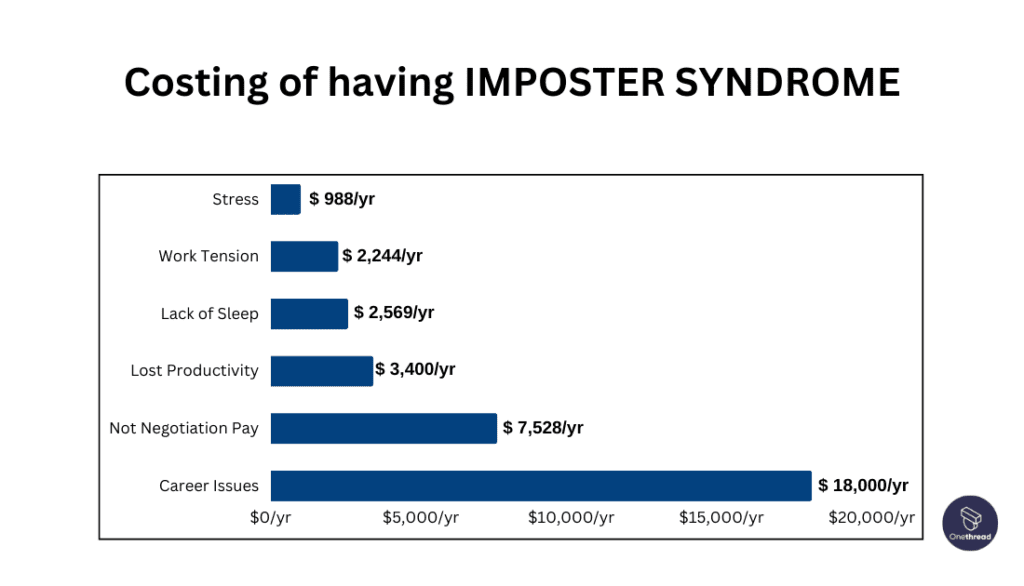
Decreased Employee Engagement and Morale
The negative impact of Imposter Syndrome on employee engagement and morale should not be underestimated. When individuals constantly doubt themselves and feel like imposters, their motivation and enthusiasm for their work may suffer. This can result in decreased job satisfaction, lower morale, and increased disengagement.
According to a survey by the International Journal of Behavioral Science, 61% of employees who experience Imposter Syndrome reported decreased job satisfaction and engagement.
Impaired Decision-Making and Risk Avoidance
Imposter Syndrome can impact decision-making and lead to risk avoidance. Individuals may be excessively cautious and avoid taking risks or making decisions due to the fear of failure or being exposed to frauds. This can limit their ability to seize opportunities, innovate, and make bold career moves.
According to a study by the Journal of Business and Psychology, individuals with Imposter Syndrome were less likely to take on challenging assignments or pursue entrepreneurial ventures.
Battling Imposter Syndrome Part 1: Know How Does It Start
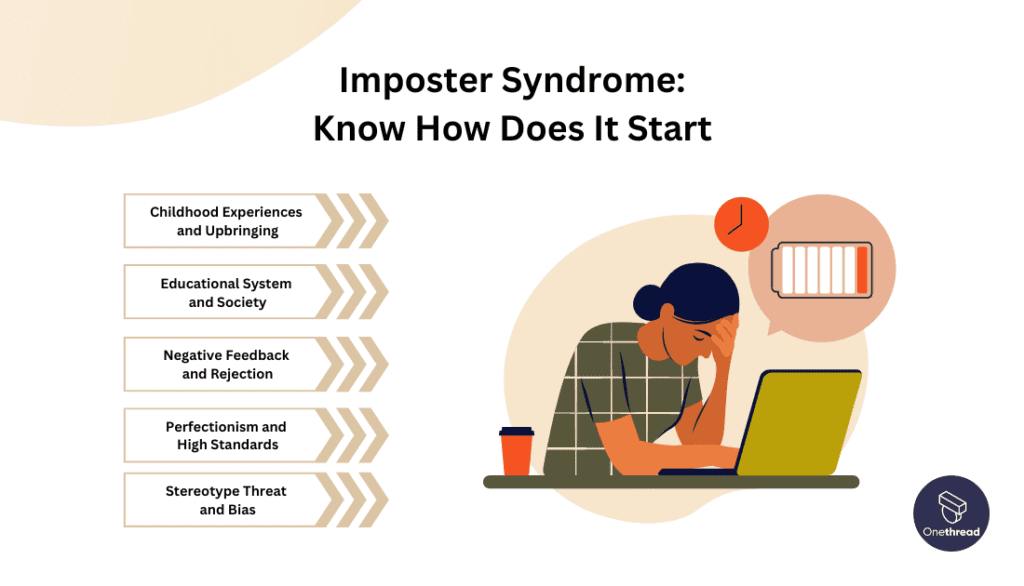
If you want to get rid of imposter syndrome once and for all, you have to know the root first; relate how it started in your life and what could be the possible reasons.
Childhood Experiences and Upbringing
- Unrealistic expectations: Growing up in an environment that places excessive pressure to achieve perfection can set the stage for Imposter Syndrome later in life.
- Critical parenting: Constant criticism or high demands from parents or authority figures can instill self-doubt and a fear of not measuring up.
Educational System and Society
- Comparison culture: Educational environments that emphasize competition and ranking can fuel a sense of inadequacy when comparing oneself to high-achieving peers.
- Societal expectations: Societal ideals of success, beauty, or intelligence can create an unattainable standard, leading individuals to feel like imposters if they don’t meet these expectations.
Negative Feedback and Rejection
- Past failures: Experiencing significant failures or setbacks can leave lasting imprints, causing individuals to question their abilities and fear future failures.
- Rejection or exclusion: Being overlooked for opportunities or facing rejection can reinforce the belief of not being deserving or capable, fostering Imposter Syndrome.
Perfectionism and High Standards
- Perfectionistic tendencies: Having an inherent desire to achieve flawlessness can contribute to self-doubt and a constant fear of falling short.
- Fear of failure: The pressure to maintain high standards and the fear of making mistakes can amplify Imposter Syndrome symptoms.
Stereotype Threat and Bias
- Social identity factors: Being part of a marginalized group and facing stereotypes or biases can intensify self-doubt and the fear of confirming negative stereotypes.
- Underrepresentation: Lack of representation in certain fields or industries can create a sense of not belonging, fueling Imposter Syndrome.
Battling Imposter Syndrome Part 2: How To Get Rid of Imposter Syndrome
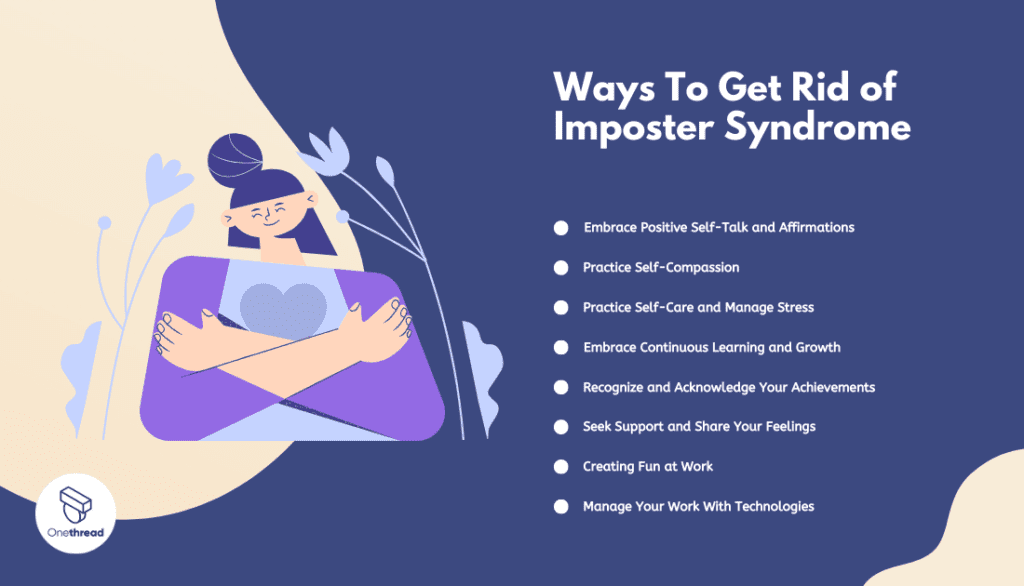
Want to find out how to get rid of imposter syndrome? It might take time but it sure will work.
Embrace Positive Self-Talk and Affirmations
Changing your self-talk from negative to positive can have a profound impact on overcoming Imposter Syndrome. Here’s how you can do it:
- Recognize Negative Self-Talk: Pay attention to the negative self-talk that fuels Imposter Syndrome. Identify common negative statements or beliefs you tell yourself.
- Challenge and Reframe Negative Thoughts: Once you identify negative thoughts, challenge them by asking for evidence or considering alternative perspectives. Reframe them into positive, empowering statements.
- Repeat Positive Affirmations: Create a list of positive affirmations that counteract your negative thoughts. Repeat these affirmations daily to reinforce positive self-beliefs and boost your confidence.
Practice Self-Compassion
Being kind to yourself is essential in overcoming Imposter Syndrome. Treat yourself with compassion and understanding:
- Practice Self-Acceptance: Accept that no one is perfect, and it’s natural to have limitations and make mistakes. Treat yourself with the same kindness and understanding you would extend to others.
- Celebrate Progress: Instead of fixating on perceived failures or shortcomings, celebrate the progress you have made. Recognize that growth takes time, and small steps forward are still meaningful achievements.
Practice Self-Care and Manage Stress
Self-care is essential for combating Imposter Syndrome and maintaining overall well-being:
- Prioritize Self-Care: Take time for activities that recharge you, such as exercise, hobbies, or spending time with loved ones. Prioritizing self-care helps reduce stress and fosters a positive mindset.
- Manage Stress: Implement stress management techniques like mindfulness, deep breathing exercises, or journaling to cope with stress and anxiety related to Imposter Syndrome.
Embrace Continuous Learning and Growth
Imposter Syndrome often thrives on the fear of being exposed as inadequate. Embrace a growth mindset and focus on continuous learning and improvement:
- Set Realistic Goals: Set achievable goals that challenge you without overwhelming you. Break them down into smaller, manageable tasks to track your progress and build confidence.
- Invest in Professional Development: Take advantage of training programs, workshops, or conferences to enhance your skills and knowledge. By investing in your development, you’ll build competence and increase self-assurance.
Recognize and Acknowledge Your Achievements
Acknowledging your achievements is a crucial step in overcoming Imposter Syndrome. It’s important to recognize your skills, abilities, and the value you bring to your work. Here are some strategies to help you do that:
- Keep a Success Journal: Create a list of small productive things to do. Document your achievements, positive feedback, and moments of success. Reviewing this journal regularly can help reinforce your accomplishments and combat self-doubt.
- Celebrate Milestones: Take the time to celebrate your accomplishments, no matter how big or small. Treat yourself to a job well done and acknowledge your hard work.
Seek Support and Share Your Feelings
Don’t suffer in silence. Seeking support from trusted colleagues, mentors, or friends can provide a valuable perspective and reassurance. Consider these steps:
- Find a Mentor or Role Model: Seek guidance from someone you admire and trust. A mentor can provide valuable insights, share their own experiences, and help you navigate Imposter Syndrome.
- Share Your Feelings with Trusted Colleagues: Open up to colleagues you trust about your struggles with Imposter Syndrome. You’ll likely discover that others have experienced similar feelings and can offer support and encouragement. If needed, open a group chat with your colleagues on social media or use a collaboration tool at work.
Creating Fun at Work
Introducing elements of enjoyment, humor, and camaraderie in the workplace can alleviate the pressure and stress associated with imposter syndrome. When people have fun at work, it promotes a positive and supportive environment, which can help combat feelings of inadequacy.
- Team-building activities: Organize team-building exercises, social events, or outings that encourage collaboration and foster positive relationships among colleagues. These activities provide opportunities to connect on a personal level, enhancing trust and reducing self-doubt.
- Encouraging humor: Create an atmosphere where lightheartedness and humor are welcomed. Encouraging jokes or incorporating playful elements in the workplace can help alleviate tension and create a more relaxed environment.
- Gamify tasks: Transform mundane or challenging tasks into games or friendly competitions to add an element of excitement. This can help shift the focus from self-doubt to enjoying the process and engaging with colleagues in a fun way.
Manage Your Work With Technologies
With the help of technology, you can manage your work and save your time and stress. Get your hands on project management tools and track your dependencies, project record, and project time.
- Project management tools: Utilize project management software or tools to effectively plan, track, and prioritize tasks and projects. These tools provide a structured framework for managing work, ensuring clarity, and reducing overwhelm.
Onethread serves as a valuable project management tool that aligns perfectly with these principles. Its user-friendly interface and versatile features, including task tracking, Kanban boards, and Gantt charts, empower users to plan and organize tasks efficiently.
- Automation and workflow optimization: Identify repetitive or time-consuming tasks that can be automated using technology. Streamlining workflows and automating routine processes can free up time and mental energy for more meaningful work, reducing the likelihood of feeling overwhelmed or inadequate.
Communicating with Your Manager About Imposter Syndrome:
Communicating your feelings of imposter syndrome to your manager can be a productive step towards overcoming it. Here’s how to approach the conversation:
- Choose the Right Time: Select a private and appropriate time to discuss your feelings. A one-on-one meeting or a scheduled catch-up might provide the right setting.
- Be Honest: Explain your experience with imposter syndrome openly. Share how it’s affecting your confidence and performance.
- Provide Context: Share specific instances where you’ve felt this way and how it impacted your work. This helps your manager understand your perspective.
- Express Your Needs: Let your manager know how they can support you. It could be through feedback, mentorship, or simply reassurance.
- Seek Advice: Ask if your manager has experienced imposter syndrome or has seen others go through it. Their insights can be reassuring.
- Discuss Strategies: Explore strategies to manage imposter syndrome, such as setting realistic expectations, focusing on achievements, and seeking professional development opportunities.
- Follow-up: Check in with your manager about your progress. Sharing your growth can reinforce the positive impact of your conversation.
Supporting Employees with Imposter Syndrome as a Manager:
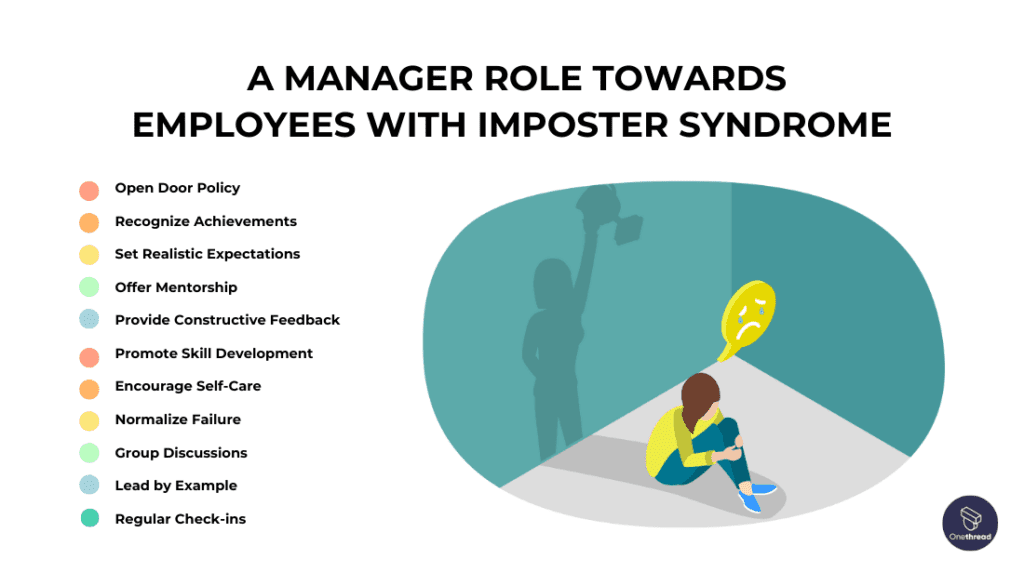
As a manager, you play a crucial role in creating a supportive environment for employees dealing with imposter syndrome:
- Open Door Policy: Make it clear that you’re available for discussions. Encourage open conversations about challenges and feelings.
- Recognize Achievements: Regularly acknowledge employees’ accomplishments and contributions. Positive feedback helps combat self-doubt.
- Set Realistic Expectations: Clearly define roles and expectations to alleviate uncertainty. Encourage incremental goals to build confidence.
- Offer Mentorship: Assign a mentor who can provide guidance and share their own experiences with imposter syndrome.
- Provide Constructive Feedback: Offer balanced feedback, focusing on strengths and areas for improvement. Help employees see their growth trajectory.
- Promote Skill Development: Invest in professional development opportunities. Upskilling can boost confidence and competence.
- Encourage Self-Care: Advocate work-life balance and self-care. Emphasize that well-being contributes to overall success.
- Normalize Failure: Discuss failures as learning experiences. Highlight that setbacks are part of growth.
- Group Discussions: Facilitate group discussions on imposter syndrome. Knowing they’re not alone can be reassuring.
- Lead by Example: Share your own experiences with imposter syndrome, showing vulnerability and the journey to overcome it.
- Regular Check-ins: Schedule periodic one-on-one meetings to gauge their well-being and progress.
By fostering a culture of support and understanding, you can help employees overcome imposter syndrome and thrive in their roles.
Wrapping Up!
Imposter syndrome at work is a common experience that affects many individuals in various professional settings. It is essential to recognize the signs and understand the impact they can have on one’s mental well-being and career progression. Remember, imposter syndrome does not define your abilities or worth. It is merely a psychological pattern that can be addressed and overcome.
If you find yourself struggling with imposter syndrome at work, take proactive steps to challenge negative self-talk, seek support from mentors or colleagues, and practice self-compassion.
Celebrate your achievements, acknowledge your strengths, and embrace a growth mindset. Creating a supportive and fun work environment, leveraging technologies for better productivity, and focusing on continuous learning can also contribute to managing imposter syndrome effectively.
Remember, you are not alone in experiencing imposter syndrome. Many successful individuals have faced similar doubts and fears but have persevered and achieved great things.
Believe in your abilities, embrace your unique contributions, and confidently navigate the challenges that come your way. You have what it takes to succeed and make a meaningful impact in your work and beyond.
FAQ
Can Imposter Syndrome be beneficial in any way at work?
While Imposter Syndrome can spur individuals to strive for excellence, its negative impacts on self-esteem and well-being generally outweigh any potential benefits. It’s important to address these feelings to maintain a healthy work environment.
Is Imposter Syndrome a long-term condition?
Imposter Syndrome doesn’t necessarily persist indefinitely. With self-awareness, effort, and support, individuals can learn to manage and overcome its effects. However, periodic episodes might still arise during moments of increased stress or change.
Can organizational culture contribute to Imposter Syndrome?
Yes, an overly competitive or critical organizational culture can exacerbate Imposter Syndrome. A culture that values collaboration, celebrates diversity of skills and emphasizes growth can help mitigate its effects and create a supportive atmosphere.
Is Imposter Syndrome the same as low self-esteem?
Imposter Syndrome is related to, but distinct from, low self-esteem. While both involve negative self-perception, Imposter Syndrome specifically revolves around doubting one’s achievements and fearing exposure as a fraud, even in the face of external evidence of competence.
Can seeking professional help be beneficial for overcoming Imposter Syndrome at work?
Yes, seeking therapy or counseling can be incredibly beneficial for addressing Imposter Syndrome. Mental health professionals can provide strategies for managing negative thoughts, building self-confidence, and developing coping mechanisms to thrive in professional settings.
